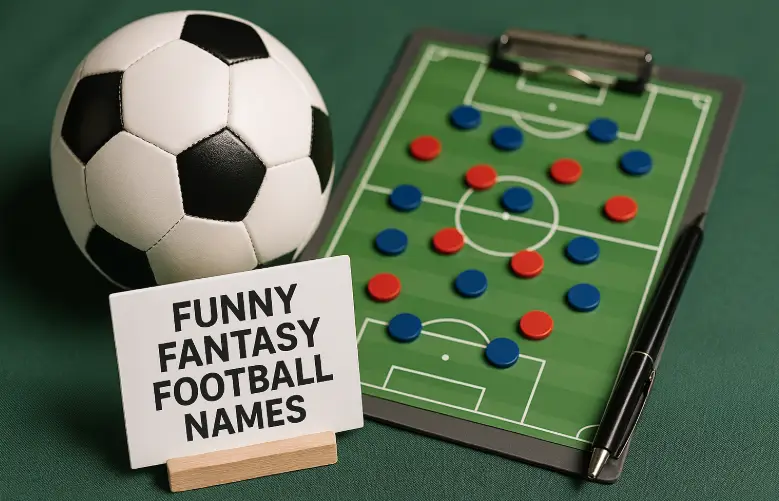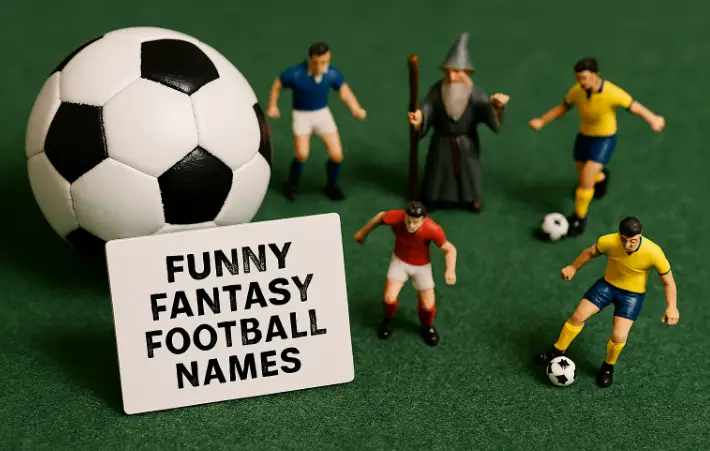
Fantasy football is more than just drafting players and setting lineups – it’s about creating memorable experiences with friends, family, and colleagues that last well beyond the regular season. While your draft strategy and waiver wire pickups determine your success on the field, your team name sets the tone for your entire fantasy football experience.
A great fantasy football team name won’t win you a title, but it will earn you laughs, bragging rights, and maybe a little fear from your league mates. The perfect funny fantasy football name becomes part of your identity in the league, sparking conversations in group chats, motivating weekly trash talk, and creating lasting memories that persist long after trophies are awarded.
This comprehensive guide explores everything you need to know about creating, choosing, and using funny fantasy football names. You’ll discover hundreds of creative options across multiple categories, learn the psychology behind what makes a name truly funny, and get practical tips for crafting your own unique team identity. Whether you’re looking for clever wordplay, pop culture references, or appropriately inappropriate humor, this guide covers the full spectrum of fantasy football naming strategies.
The Basics of Fantasy Football Team Names
What Makes a Fantasy Football Team Name Special
Your fantasy football team name serves as your digital identity in the league. It appears on scoreboards, in chat messages, and on championship certificates. More importantly, it reflects your personality, sense of humor, and approach to the game. A well-chosen name can intimidate opponents, break the ice in new leagues, and provide endless entertainment throughout the season.
The tradition of funny team names in fantasy football dates back to the early days of the hobby. Before digital platforms made team management easier, fantasy leagues were managed through newspapers, magazines, and handwritten scorecards. Even then, creative team names were a hallmark of engaged fantasy players who understood that the social aspect of the game was just as important as the competition itself.
Why Players Choose Creative and Humorous Names
Fantasy football team names serve multiple psychological and social functions within leagues. They act as conversation starters, helping break the ice in new leagues or workplace competitions. Creative names demonstrate wit and personality, often becoming more memorable than the actual team performance. They also provide a form of psychological warfare – a cleverly intimidating or hilariously inappropriate name can get under opponents’ skin before games even begin.
The humor element is particularly important because fantasy football is ultimately entertainment. While the competition can be intense, the funny team names remind everyone that this is meant to be fun. They create shared experiences and inside jokes that strengthen league bonds and keep participants engaged throughout long seasons.
Characteristics of Great Funny Fantasy Football Names

The Power of Wordplay and Puns
The most enduring funny fantasy football names rely on clever wordplay that combines football terminology with everyday phrases, pop culture references, or player names. Effective puns work on multiple levels – they’re immediately recognizable as football-related while delivering an unexpected twist that generates laughter.
Great wordplay often involves replacing key words in familiar phrases with football terms or player names. The best examples feel natural and flow well when spoken aloud, making them perfect for trash talk and league communications. They also tend to be memorable, which is crucial for building your team’s reputation within the league.
Pop Culture Integration
Pop culture references provide endless material for fantasy team names because they tap into shared cultural experiences. References to popular movies, TV shows, music, and current events create instant recognition and connection with league members. The key is choosing references that are widely known and have staying power – a name based on a viral meme might feel dated by playoff time.
Your team name can be personal (for me, that might be Fabs Five, The Fabtastic Four or The Fab and The Furious). You can also use names inspired by your favorite NFL team (for me, that might be Dak to the Future, The Dak Side, Dex Dispensers or CeeDee’s Nuts). The best pop culture names work seamlessly with football elements, creating something that feels both familiar and fresh.
NFL Player Name Creativity
Player-based puns remain the most popular category of fantasy football team names because they’re directly relevant to the game and provide endless opportunities for creativity. These names work best when they incorporate the player’s actual name into a familiar phrase or concept, creating an immediate connection between your team identity and your roster.
The most successful player puns feel natural and avoid forced combinations. They often play on the sound of the player’s name rather than just the spelling, making them work better in spoken conversation. The best player puns also have longevity – they should still be funny even if that player isn’t on your team anymore.
Categories of Funny Fantasy Football Names
NFL Player-Based Puns by Position
Quarterback Wordplay
Quarterbacks provide some of the richest material for fantasy team names because they’re the most visible and recognizable players. Current stars like Patrick Mahomes, Josh Allen, and Jalen Hurts offer numerous punning opportunities that fantasy managers eagerly exploit.
Patrick Mahomes names have exploded in popularity, with options like “Mahomes Sweet Mahomes,” “Mahomes Alone,” and “Patrick My Homes” dominating fantasy leagues. These names work because they play on his distinctive last name while incorporating familiar phrases or concepts that enhance memorability.
Josh Allen provides opportunities for strength-based puns like “Josh Allen Wrench,” “Allen in a Day’s Work,” and “Allen You Need is Love.” The versatility of his first and last name allows for creative combinations that work across multiple contexts.
Jalen Hurts names often play on his emotional surname: “The Truth Hurts,” “Jalen When it Hurts,” and “Hurts So Good” all capitalize on the natural connection between his name and feelings of pain or difficulty.
Running Back Creativity
Running backs offer unique naming opportunities because their position emphasizes power, speed, and agility. Names in this category often incorporate movement, strength, or geographic references that align with their playing style.
Derrick Henry names leverage his legendary power running style with options like “Derrick Henry and the Chocolate Factory,” “Derrick’s Demolition Derby,” and “The Derrick-ing Ball.” These names work because they emphasize his destructive running style while maintaining clever wordplay.
Christian McCaffrey provides religious and Irish-themed pun opportunities: “McCaffrey’s Irish Coffee,” “Christian Soldiers,” and “Run CMC” (playing on the rap group Run-DMC) all capture different aspects of his name and playing style.
Nick Chubb offers straightforward punning potential with names like “Chubb Life,” “Get Chubb-y,” and “Chubb’s Pub” that emphasize the humor potential in his surname while keeping the references accessible and memorable.
Wide Receiver Wordplay
Wide receivers often have dynamic names that lend themselves to speed, precision, and excitement-based puns. These names frequently incorporate elements of quick movement or impressive catches.
Ja’Marr Chase names play on pursuit themes: “Ja’Marr-athon Man,” “Chase Your Dreams,” and “Cut to the Chase” all work with his surname while adding layers of meaning related to persistence and goal achievement.
Justin Jefferson offers presidential and formal naming opportunities: “Jefferson’s Airplane,” “Mr. Jefferson,” and “Declare Independence” all reference the historical figure while maintaining football relevance.
Tyreek Hill names often emphasize speed: “Hill of Fame,” “Hill Yeah,” and “Over the Hill” play on his reputation as one of the fastest players in the NFL while creating memorable team identities.
Pop Culture-Inspired Fantasy Names
Movie Reference Names
Movie references provide timeless material for fantasy team names because great films remain culturally relevant for decades. The best movie-based names choose widely recognized films and incorporate football elements seamlessly.
Star Wars references dominate this category with names like “The Empires Strike Back,” “Jabba the Hutt Route,” “Death Star Receivers,” and “May the Fours Be With You” (referencing fourth down conversions). These names work because Star Wars has multigenerational appeal and endless quotable material.
Marvel superhero names offer power-based puns perfect for fantasy football: “The Incredible Hulk Smash,” “Thor’s Hammer Time,” “Iron Manning,” and “Captain America’s Shield Wall” all emphasize strength and heroism while maintaining clear football connections.
Classic comedies provide humor-based naming opportunities: “Anchorman’s News Team,” “Zoolander’s Blue Steel,” “Wedding Crasher Tackles,” and “Step Brothers Fantasy” all reference beloved comedy films while creating memorable team identities.
Television Show References
TV show references work particularly well for fantasy names because television creates ongoing relationships with characters and storylines that fantasy football participants can relate to throughout long seasons.
The Office remains incredibly popular for fantasy names: “Dunder Mifflin Paper Champions,” “Schrute Farms Fantasy,” “That’s What She Said Offense,” and “Michael Scott’s Tot Touchdowns” all reference specific characters and situations while maintaining football relevance.
Friends offers relationship-based puns: “We Were On A Bye Week,” “Ross’s Unagi Defense,” “Chandler Could This Be Any More Fantasy,” and “Joey Doesn’t Share Touchdowns” all play on memorable episodes and character traits.
Game of Thrones provides epic naming opportunities: “Kings Landing Touchdowns,” “Winter is Coming for Your Defense,” “A Song of Wins and Fires,” and “Hodor’s Hold the Door Defense” all reference major plot elements while creating intimidating team identities.
Music and Celebrity References
Music references create rhythm and energy in team names while tapping into shared cultural experiences. The best music-based names choose universally recognized songs or artists and adapt their titles for football contexts.
Classic rock bands provide powerful naming material: “Led Zeppelin’s Stairway to Seven,” “Pink Floyd’s Dark Side of the Noon,” “The Rolling Stones Can’t Get No Satisfaction Defense,” and “Queen’s We Will Rock Your Team” all reference iconic bands while creating memorable football connections.
Hip-hop culture offers rhythm and attitude perfect for fantasy football: “Notorious T.D.,” “Jay-Z’s 99 Problems But A Win Ain’t One,” “Drake’s Started From the Bottom Now We Here,” and “Kanye’s Gold Digger Defense” all capture the confidence and swagger associated with both hip-hop and fantasy football success.
Best All-Time Funny Fantasy Football Names
Classic Names That Never Go Out of Style
Certain fantasy football team names have achieved legendary status within the community, appearing in leagues year after year because of their perfect combination of humor, cleverness, and memorability. These classics often become benchmarks against which new names are measured.
“Prestige Worldwide” also happens to be one of the absolute most popular fantasy football team names, year in and year out. This reference to the comedy film “Step Brothers” has maintained popularity because it perfectly captures the combination of false confidence and genuine enthusiasm that characterizes fantasy football participants.
“Show Me Your TDs” represents another timeless classic that works on multiple levels – it’s a play on a popular party phrase while incorporating football terminology. The name maintains its humor year after year because it’s both slightly inappropriate and completely football-relevant.
“The League of Extraordinary Gentlemen” appeals to fantasy players who want to sound sophisticated while maintaining pop culture relevance. This name works particularly well in competitive leagues where participants take their team building seriously but still want to acknowledge the entertainment value of the competition.
Wordplay Examples That Stand the Test of Time
The best wordplay-based names combine familiar phrases with football terminology in ways that feel natural and memorable. “Injured Reserve This” plays on the common fantasy football experience of dealing with player injuries while incorporating defiant attitude that resonates with competitive league members.
“Gronkey Business” represents player-specific wordplay at its finest, combining Rob Gronkowski’s nickname with a serious movie title to create something that’s both funny and slightly intimidating. Even as players retire or change teams, these names often maintain their appeal because they’ve become part of fantasy football culture.
“Victorious Secret” takes a well-known brand name and adds competitive elements that work perfectly for fantasy football. The name suggests both victory and hidden knowledge, appealing to fantasy players who want to project confidence while acknowledging the strategic elements of the game.
Fan-Voted Greatest Fantasy Team Names
Fantasy football communities regularly vote on their favorite team names, and certain options consistently rank among the most beloved. “Boom Goes the Dynamite” references a viral sports blooper while capturing the explosive nature of big fantasy football plays.
“The Blind Side” works on multiple levels – it references a popular football movie while suggesting strategic advantage and unexpected plays. The name has maintained popularity across multiple seasons because it combines cultural relevance with football strategy implications.
“Forgetting Brandon Marshall” plays on the movie “Forgetting Sarah Marshall” while incorporating a real NFL player name. These types of references work best when they choose players with distinctive names that fit naturally into existing cultural references.
Inappropriate and Edgy Team Names
Walking the Line Between Funny and Offensive
Fantasy football leagues often embrace humor that pushes boundaries, but successful inappropriate names require careful balance between edginess and genuine offense. The best slightly inappropriate names rely on double entendres and clever wordplay rather than explicit content or personal attacks.
Names that work well in this category typically use innuendo or mild profanity while maintaining clear football connections. “Holy Shipz” offers a slightly edgy play on religious exclamations while avoiding truly offensive content. “Fudruckers” references a real restaurant chain while sounding mildly inappropriate to those unfamiliar with the brand.
The key to successful edgy humor lies in understanding your league’s tolerance levels and choosing names that generate laughs rather than complaints. Names that cross into truly offensive territory often backfire, creating tension rather than entertainment and potentially leading to league conflicts.
Understanding League Guidelines
Most fantasy platforms and private leagues have naming guidelines that prohibit explicitly offensive content, hate speech, or names that could be considered workplace harassment. Understanding these boundaries helps ensure your edgy humor enhances rather than damages the league experience.
Professional workplace leagues typically require cleaner naming conventions, while friend groups might tolerate more aggressive humor. The best approach involves choosing names that push boundaries appropriately for your specific context while maintaining the spirit of fun competition.
Consider seasonal longevity when choosing edgy names – something that seems funny during draft season might become problematic during playoff weeks when league tensions run higher. Names that maintain their humor throughout the entire season tend to work better than those dependent on immediate shock value.
Alternative Approaches to Boundary-Pushing Humor
Instead of relying on explicit content, creative fantasy players often achieve edgy humor through clever misdirection and sophisticated wordplay. “Victorious Secret” sounds provocative while remaining completely appropriate for any league context.
Cultural references can provide edgy appeal without crossing offensive lines. “Fight Klub” references the popular movie while adding football-appropriate spelling changes. “Pulp Fiction” provides numerous quotable moments that can be adapted for fantasy football without becoming offensive.
Player name combinations often generate naturally edgy humor without requiring explicit content. Names incorporating players like “Dick Butkus” or “Romeo Crennel” can sound inappropriate while using only legitimate NFL player names, creating humor through natural wordplay rather than manufactured controversy.
Themed Fantasy Football Names
Animal-Themed Categories
Animal themes provide rich material for fantasy football names because they naturally incorporate aggression, strategy, and pack mentality that align perfectly with competitive fantasy sports. These names often work well because they suggest both power and intelligence while maintaining broad appeal.
Predator animals offer intimidating naming opportunities: “The Pack Hunters,” “Lions Den Fantasy,” “Shark Tank Champions,” and “Eagle Eye Strategy” all suggest dominance while maintaining clear animal connections that translate well to team identity and logo design.
Pack animals provide team-oriented naming options: “Wolf Pack Fantasy,” “Herd Mentality,” “The Pride Strategy,” and “Colony Collapse Defense” all emphasize group cooperation and strategic thinking that mirrors successful fantasy football management.
Unexpected animal choices can create memorable contrast: “The Honey Badgers,” “Platypus Dynasty,” “Penguin Power Play,” and “Sloth’s Slow and Steady” all use less common animal references to create unique team identities that stand out in league communications.
Food and Drink Themes
Food and drink themes work particularly well for fantasy football because they create comfort and familiarity while offering endless opportunities for football-related wordplay. These names often generate warmth and humor that enhance league social dynamics.
Beer and alcohol references naturally align with fantasy football culture: “Brew Crew Champions,” “Hops and Touchdowns,” “Whiskey Business,” and “The Drunken Dragons” all acknowledge the social aspects of fantasy football while maintaining competitive edge.
Comfort food references create welcoming team identities: “Mac and Cheese Dreams,” “Pizza Party Champions,” “Barbecue Pit Strategy,” and “The Hungry Hippos” all suggest satisfaction and community while offering opportunities for food-themed trash talk and celebrations.
Spicy food names provide competitive attitude: “Jalapeño Business,” “Hot Sauce Heroes,” “Sriracha Squad,” and “The Spice is Right” all suggest heat and intensity while creating memorable team identities that work well for aggressive fantasy players.
Historical and Geek Culture Themes
Historical and geek culture themes appeal to fantasy players who want to demonstrate intelligence and cultural awareness while maintaining entertainment value. These names often work well in educated or professionally-oriented leagues.
Historical figures provide authoritative naming opportunities: “Napoleon’s Complex Strategy,” “Caesar’s Fantasy Empire,” “Vikings Raid Your Team,” and “The Renaissance Men” all reference important historical periods while suggesting strategic thinking and leadership.
Gaming references connect to the strategic elements of fantasy football: “Dungeons and Draft Picks,” “Level Up Your Lineup,” “Boss Battle Sunday,” and “Achievement Unlocked Victory” all reference video gaming culture while emphasizing the competitive and strategic aspects of fantasy sports.
Science fiction themes offer futuristic appeal: “Starfleet Fantasy Command,” “The Jedi Council,” “Cyberpunk Champions,” and “Time Travel Dynasty” all suggest advanced thinking and strategic superiority while creating memorable team identities.
Creating Your Own Funny Fantasy Football Name
Brainstorming Techniques for Original Ideas
Developing original funny fantasy football names requires systematic approaches that generate multiple options before settling on final choices. Start by listing your favorite players, pop culture references, and personal interests, then look for natural connections and wordplay opportunities.
Create word association chains starting with football terms like “touchdown,” “quarterback,” “blitz,” or “endzone,” then branch out to related concepts, rhyming words, and similar-sounding phrases. This technique often reveals unexpected connections that lead to original naming opportunities.
Consider your league’s personality and inside jokes when brainstorming. Names that reference shared experiences, local culture, or recurring league themes often generate the strongest reactions and most memorable identities. Personal touches make names feel authentic rather than generic.
Using Current Players Creatively
Current NFL stars provide the freshest material for fantasy team names, but successful player-based names require more than simple name substitution. Look for players whose names naturally fit into existing phrases, cultural references, or conceptual frameworks.
Study player personalities, playing styles, and notable achievements when developing name ideas. A player known for spectacular catches might inspire names related to magic or impossibility, while a powerful running back could generate names emphasizing destruction or force.
Consider pronunciation and spelling when creating player puns. Names that work in spoken conversation tend to be more memorable and effective for league interactions. Test potential names by saying them aloud and seeing if they feel natural in normal speech patterns.
Incorporating Personal and League-Specific Elements
The most memorable fantasy football names often incorporate personal elements that reflect the team owner’s personality, interests, or circumstances. Consider your profession, hobbies, family situation, or unique characteristics when brainstorming name ideas.
League-specific references create inside jokes that enhance community feelings and generate ongoing entertainment. Names that reference draft day events, previous season outcomes, or recurring league personalities often become beloved fixtures that persist across multiple seasons.
Geographic references work particularly well in local leagues or those with participants from specific regions. City names, local landmarks, regional food specialties, or area-specific cultural references all provide material that feels personally relevant while maintaining broad appeal.
Online Name Generators: Pros and Cons
Fantasy football name generators provide quick inspiration and can reveal combinations you might not have considered independently. These tools work best as starting points for further creativity rather than final solutions, since generated names often lack the personal touch that makes truly memorable team identities.
The main advantage of generators lies in their ability to rapidly combine multiple elements – player names, pop culture references, and football terminology – in ways that might not occur naturally during manual brainstorming. They can break creative blocks and provide fresh perspectives on familiar elements.
However, generator-created names often feel generic and may appear in multiple leagues, reducing their uniqueness and personal connection. The most effective approach involves using generators for inspiration while adding personal modifications that create truly original final products.
The Social Dynamics of Funny Fantasy Football Names
How Names Enhance League Communication
Fantasy football team names serve as conversation catalysts throughout the season, providing natural topics for league chat discussions, weekly trash talk, and celebratory messages. Creative names give league members something to reference beyond simple win-loss records, creating richer social interactions.
Names often become shorthand for team identity and playing style within league communications. A team called “The Waiver Wire Warriors” automatically suggests aggressive free agent strategies, while “Steady Eddie’s Squad” implies consistent, conservative management approaches that influence how league members perceive and interact with different teams.
The social capital generated by clever team names often extends beyond individual seasons, creating reputations that persist across multiple years. League members remember funny names long after they forget specific seasonal records, making naming strategy an investment in long-term league relationships.
Trash Talk and Competitive Psychology
Well-chosen team names provide ammunition for creative trash talk while giving opponents targets for their own comedic attacks. Names that seem intimidating might draw extra competitive attention, while self-deprecating humor can defuse tension and create sympathetic alliances.
The psychological impact of team names shouldn’t be underestimated – facing a team with an intimidating or cleverly confident name can create subtle mental pressure, while obviously joke names might cause opponents to underestimate the team’s actual competitive threat. This dynamic adds an extra strategic layer to naming decisions.
Successful trash talk often incorporates team names into broader competitive narratives, using naming choices as evidence of personality traits or strategic approaches. Names that provide rich material for ongoing jokes and references tend to enhance rather than detract from competitive enjoyment.
Case Studies: Famous Leagues and Memorable Names
High-profile fantasy leagues, including those involving celebrities, professional athletes, and media personalities, often showcase the creative potential of fantasy football naming. These leagues demonstrate how thoughtful naming strategies enhance entertainment value and create lasting memories.
The popularity of fantasy football podcasts and media coverage has highlighted particularly creative league naming conventions, showing how well-chosen names can become part of broader fantasy football culture. Some names achieve viral status, spreading beyond their original leagues to influence naming trends across the fantasy community.
Professional workplace leagues often produce particularly creative naming strategies as participants attempt to balance humor with professional appropriateness. These constraints often lead to sophisticated wordplay and cultural references that demonstrate the intellectual creativity possible within fantasy football naming.
Current Trends in Funny Fantasy Football Names for 2025
Trending Names Based on Current Pop Culture
The 2025 fantasy football season has introduced fresh naming opportunities based on recent pop culture developments, trending social media content, and current NFL storylines. Names incorporating recent movie releases, viral internet phenomena, and current events provide immediate relevance while capturing the zeitgeist of the current season.
Streaming service references have become increasingly popular as content platforms produce original programming that generates widespread cultural discussion. Names incorporating Netflix series, Disney+ content, and premium streaming exclusives reflect the current entertainment landscape while providing rich material for football-related wordplay.
Social media trends offer immediate cultural relevance, though they require careful selection to avoid references that might feel dated by season’s end. Names that incorporate enduring social media platforms or long-running internet culture tend to have better staying power than those based on fleeting viral moments.
Current events can provide naming material, but successful current event names typically focus on broadly understood developments rather than specific political or controversial topics that might create league division rather than entertainment.
Viral Social Media-Inspired Team Names
Social media platforms generate constant streams of new phrases, concepts, and cultural references that creative fantasy players quickly adapt for team naming purposes. The challenge lies in choosing references with enough staying power to remain relevant throughout entire fantasy seasons.
Meme culture provides particularly rich material for fantasy names because successful memes typically have broad recognition and inherent humor. Names that reference enduring meme formats or universally understood internet jokes tend to work better than those based on extremely recent viral content.
Platform-specific language from Twitter, TikTok, Instagram, and other social media services often creates new phrases and concepts that can be adapted for fantasy football contexts. The key involves choosing elements that translate well to fantasy sports while maintaining their original humor and cultural relevance.
Influencer references can provide naming material, but they require careful selection to ensure broad recognition within your specific league. Names that reference widely known personalities tend to work better than those based on niche content creators who might not be familiar to all league members.
New NFL Rookies and Rising Stars
Each NFL season introduces new players whose names provide fresh material for fantasy football team names. Rookie classes often include players with distinctive names that lend themselves naturally to creative wordplay and pop culture integration.
The 2025 rookie class has provided several naming opportunities based on unique name combinations, college backgrounds, and early professional achievements. Players who make immediate impacts or generate significant media attention often inspire naming trends that spread rapidly through fantasy football communities.
Draft story narratives surrounding high-profile rookies often provide additional context for naming creativity. Players selected in dramatic circumstances, those with compelling background stories, or rookies who exceed expectations all generate material that creative fantasy managers can incorporate into team naming strategies.
Breakout second and third-year players also provide fresh naming material as they establish their professional identities and develop signature playing styles. These players often offer the best of both worlds – growing name recognition combined with fresh creative possibilities that haven’t been exhausted by previous fantasy seasons.
The Psychology Behind Fantasy Football Humor
Why Humor Enhances the Fantasy Experience
Humor serves multiple important functions within fantasy football culture, transforming what could be purely statistical exercises into rich social experiences that strengthen relationships and create lasting memories. Funny team names act as social lubricants that ease competitive tensions and encourage participation from league members with varying levels of football knowledge.
The shared laughter generated by clever team names creates positive associations with fantasy football participation, making league members more likely to remain engaged throughout challenging seasons and return for future years. This social bonding aspect often proves more valuable than individual seasonal success in maintaining long-term league stability.
Humor also provides emotional regulation mechanisms that help fantasy participants cope with the inevitable frustrations of player injuries, unexpected poor performances, and statistical bad luck that characterize fantasy sports. Maintaining perspective through humor prevents competitive disappointment from damaging relationships or reducing enjoyment.
Group Bonding Through Shared Laughter
Fantasy leagues function as social communities where shared experiences create group identity and mutual understanding. Funny team names contribute to this community building by providing common references that generate ongoing entertainment throughout seasons.
The collaborative appreciation of humor creates inclusive environments where league members feel comfortable expressing creativity and taking social risks. Teams with funny names often become focal points for league communication, generating attention and interaction that enhances the overall social experience for all participants.
League culture development often centers around humorous traditions, recurring jokes, and memorable team names that become part of the group’s shared history. These cultural elements provide continuity across seasons and help integrate new members into established league dynamics.
Funny Names as Identity Expression
Fantasy football team names provide opportunities for creative self-expression within structured competitive environments. Participants use naming choices to communicate aspects of their personality, sense of humor, and approach to competition that might not be evident through gameplay alone.
The identity expression function of team names helps fantasy participants maintain individual distinctiveness within group contexts. Even in leagues where participants know each other well, creative team names can reveal surprising aspects of personality and provide conversation topics that extend beyond football discussions.
Personal branding through team names allows fantasy participants to establish reputations and expectations that influence how league members perceive and interact with them. Names that suggest strategic sophistication, competitive intensity, or humorous self-deprecation all create different social dynamics and expectations.
When considering inspiration for your fantasy football names, you might also find value in learning about leadership and communication in sports contexts. For instance, understanding the impact of Women Football Speaker 2025 can provide insights into how effective communication and motivational strategies translate from professional sports to fantasy league management, helping you develop team names that not only entertain but also inspire confidence in your strategic approach.
Advanced Naming Strategies and Creative Techniques
Multi-Layered Wordplay Approaches
The most sophisticated funny fantasy football names work on multiple levels simultaneously, combining obvious humor with subtle references that reward closer examination. These names often incorporate football terminology, pop culture references, and personal elements in ways that create rich, memorable team identities.
Double entendre techniques allow names to suggest multiple meanings simultaneously, often combining innocent surface interpretations with more suggestive or competitive undertones. This approach creates names that work in various social contexts while maintaining their entertainment value across different audience types.
Nested references incorporate multiple cultural touchstones within single team names, appealing to different knowledge bases and interests among league members. A name might simultaneously reference a classic movie, current NFL player, and personal league history, creating something that resonates on multiple levels.
Phonetic wordplay uses sound similarities rather than strict spelling matches to create connections between disparate concepts. These names often work better in spoken conversation than written communication, making them particularly effective for leagues that emphasize social interaction and trash talk.
Seasonal Adaptation Strategies
The most successful fantasy football names maintain their relevance and humor throughout entire seasons, from draft day excitement through championship celebrations. This requires choosing references and concepts with enough depth and flexibility to remain entertaining across changing circumstances.
Evergreen humor principles focus on naming elements that don’t depend on specific weekly outcomes or current events that might lose relevance as seasons progress. Names based on enduring pop culture references, fundamental human experiences, or universal football concepts tend to maintain their appeal longer than those based on momentary trends.
Adaptive naming frameworks allow for slight modifications or reinterpretations as seasons develop, keeping names fresh while maintaining core identity elements. A well-chosen name might take on new meanings as your team’s season unfolds, providing ongoing entertainment value through multiple contexts.
Playoff readiness considerations ensure names work well in championship contexts as well as regular season play. Names that sound appropriately confident for potential playoff runs while maintaining humor if seasons don’t develop as hoped provide insurance against seasonal disappointment affecting team identity enjoyment.
The art of creating memorable fantasy football experiences extends beyond individual teams to encompass the broader community aspects of league management. Just as restaurants create memorable experiences through thoughtful presentation and community building, understanding concepts like Football Club Menu planning can inform how fantasy league commissioners structure their competitions to maximize entertainment value and maintain long-term participant engagement, creating environments where creative team names flourish and contribute to lasting social connections.
Professional and Workplace League Considerations
Maintaining Appropriateness in Professional Settings
Workplace fantasy leagues require careful balance between entertainment value and professional appropriateness, making naming strategy particularly important for maintaining positive relationships while still capturing the competitive fun that makes fantasy football engaging.
Professional boundaries vary significantly between different workplace cultures, industries, and organizational hierarchies. Names that work perfectly in casual startup environments might be completely inappropriate in conservative corporate settings or public sector organizations where different professional standards apply.
HR-friendly approaches focus on creativity and humor that enhance workplace relationships rather than creating potential conflicts or compliance issues. The best professional fantasy names demonstrate wit and personality while avoiding content that could be interpreted as harassment, discrimination, or inappropriate workplace behavior.
Team building benefits of appropriate workplace fantasy leagues include improved cross-departmental communication, informal leadership development opportunities, and stress relief mechanisms that can enhance overall workplace satisfaction and productivity when managed thoughtfully.
Long-Term League Identity Management
Fantasy leagues that persist across multiple seasons develop their own cultures and traditions, making team naming strategy part of broader community building efforts that influence league longevity and participant satisfaction.
Brand consistency considerations apply when team names become associated with particular management styles, strategic approaches, or personality traits that league members expect to persist across seasons. Changes in naming approaches should align with any evolution in your fantasy football strategy or league role.
Legacy building through memorable team names creates stories and references that become part of league history, providing continuity and shared experiences that strengthen community bonds and encourage continued participation across multiple years.
Reputation management involves understanding how team names contribute to your league identity and considering how naming choices might influence draft positioning, trade negotiations, and social dynamics that affect both competitive success and overall enjoyment.
Conclusion: Crafting Your Perfect Fantasy Football Identity
The journey to finding the perfect funny fantasy football name combines creativity, cultural awareness, social understanding, and strategic thinking in ways that reflect the broader appeal of fantasy sports as both competitive endeavor and social entertainment. Your team name becomes a crucial part of your fantasy football identity, influencing how league members perceive your strategic approach while providing ongoing opportunities for humor and connection.
The most successful funny fantasy football names achieve balance between multiple objectives: entertaining your league, expressing your personality, maintaining appropriate boundaries, and creating lasting positive associations with your fantasy football participation. This balance requires thoughtful consideration of your specific league context, personal comfort levels, and long-term relationship goals within the fantasy football community.
Remember that the perfect name for your situation might not be the funniest option available – it should be the one that best serves your specific goals while enhancing rather than detracting from the overall league experience. Whether you choose clever wordplay, pop culture references, player puns, or completely original concepts, the key lies in selecting something that feels authentic to your personality while contributing positively to the competitive and social dynamics of your fantasy football league.
Fantasy football names represent opportunities for creative expression within structured competitive frameworks, allowing participants to demonstrate wit, personality, and strategic thinking while building community connections that often extend far beyond individual seasons. The time and thought invested in choosing the right funny name pays dividends throughout the entire fantasy football experience, creating memories and relationships that persist long after trophies are awarded and seasons conclude.
As you develop your own funny fantasy football name, consider it an investment in the broader social experience of fantasy sports participation. The perfect name will generate laughs, spark conversations, and create positive associations that enhance your enjoyment while contributing to the rich community culture that makes fantasy football one of America’s most popular pastimes.
Frequently Asked Questions
u003cstrongu003eWhat are the funniest fantasy football team names of all time?u003c/strongu003e
The funniest fantasy football team names typically combine clever wordplay with pop culture references or NFL player puns. u0022Prestige Worldwideu0022 consistently ranks as one of the most popular fantasy football team names year after year due to its perfect reference to u0022Step Brothersu0022 and its implication of false grandeur that characterizes many fantasy football participants. Other all-time favorites include u0022Show Me Your TDs,u0022 u0022The League of Extraordinary Gentlemen,u0022 u0022Gronkey Business,u0022 and u0022Victorious Secret.u0022 These names work because they’re immediately recognizable, work on multiple levels, and remain funny throughout entire seasons regardless of team performance.
u003cstrongu003eWhat are the best fantasy football names for 2025?u003c/strongu003e
The best fantasy football names for 2025 incorporate current NFL stars, recent pop culture developments, and trending social media references while maintaining long-term appeal. Player-based options include u0022Mahomes Sweet Mahomes,u0022 u0022Josh Allen Wrench,u0022 u0022The Truth Hurtsu0022 (Jalen Hurts), u0022Ja’Marr-athon Manu0022 (Ja’Marr Chase), and u0022Jefferson’s Airplaneu0022 (Justin Jefferson). Pop culture names drawing from recent streaming content, viral social media trends, and current movie releases provide immediate relevance. However, the most successful 2025 names balance current relevance with timeless appeal, ensuring they remain funny throughout the entire season and potentially beyond.
u003cstrongu003eCan I use inappropriate or NSFW names in fantasy football?u003c/strongu003e
Most fantasy football platforms and leagues have naming guidelines that prohibit explicitly offensive content, hate speech, or names that could constitute workplace harassment. The acceptability of inappropriate names depends heavily on your specific league context – friend groups might tolerate edgier humor while workplace leagues require cleaner content. The most successful u0022inappropriateu0022 names rely on clever double entendres, mild innuendo, or misdirection rather than explicit content. Names like u0022Holy Shipz,u0022 u0022Victorious Secret,u0022 or player-based puns using names like u0022Dick Butkusu0022 can provide edgy appeal while remaining within most platform guidelines. Always consider your league’s tolerance levels and professional context before choosing potentially controversial names.
u003cstrongu003eWhat are some funny Patrick Mahomes-inspired team names?u003c/strongu003e
Patrick Mahomes’ distinctive name provides excellent material for fantasy football puns. Popular Mahomes-inspired names include u0022Mahomes Sweet Mahomesu0022 (playing on the classic song), u0022Mahomes Aloneu0022 (referencing the movie u0022Home Aloneu0022), u0022Patrick My Homesu0022 (suggesting residential theft), u0022Mahomes is Where the Heart Is,u0022 u0022There’s No Place Like Mahomes,u0022 and u0022Mahomes on the Range.u0022 These names work because u0022Mahomesu0022 sounds similar to u0022homeu0022 while his first name u0022Patricku0022 offers additional punning opportunities. The key to successful Mahomes names lies in finding phrases where his surname fits naturally while maintaining the original meaning and humor of the reference.
u003cstrongu003eWhat are the most popular fantasy football names each year?u003c/strongu003e
The most popular fantasy football names each year typically reflect current NFL storylines, trending pop culture references, and recurring wordplay themes that fantasy players return to season after season. Consistent favorites include player puns featuring the biggest stars, movie references from widely beloved films, and TV show names from popular series. Names incorporating Tom Brady, Aaron Rodgers, and other superstar players maintain popularity across multiple seasons, while newer stars like Patrick Mahomes, Josh Allen, and Justin Jefferson generate fresh naming trends. Pop culture staples like Star Wars, Marvel movies, u0022The Office,u0022 and classic comedies provide endless material that remains popular year after year because of their broad cultural appeal and quotable content.
u003cstrongu003eDo funny names give any advantage in fantasy football?u003c/strongu003e
Funny fantasy football names don’t provide direct competitive advantages in terms of player performance or statistical outcomes, but they can offer psychological and social benefits that indirectly impact your fantasy football experience. A memorable, intimidating, or cleverly confident name might create subtle mental pressure for opponents while generating positive attention that enhances your league reputation. Names that spark conversation and laughter often make their owners more memorable and likeable, potentially influencing trade negotiations and waiver wire discussions. Additionally, having a great team name increases your own enjoyment and engagement with the league, which can lead to more active management and better long-term results. While the effect is indirect, the social and psychological benefits of a well-chosen funny name can contribute to a more successful and enjoyable fantasy football experience.
u003cstrongu003eHow often should I change my fantasy football team name?u003c/strongu003e
The frequency of fantasy football name changes depends on personal preference and league culture, but most successful fantasy managers find a balance between consistency and freshness. Some players prefer maintaining the same name across multiple seasons to build brand recognition and league identity, while others enjoy the creative challenge of developing new names each year. A good middle ground involves keeping successful names for multiple seasons while making strategic changes when better options arise or when team identity shifts significantly. Consider changing names when moving to new leagues, after major roster overhauls, or when you discover genuinely superior options. However, avoid changing names mid-season unless absolutely necessary, as this can confuse league communications and reduce the memorability that makes great names effective.
u003cstrongu003eWhat should I avoid when creating a fantasy football team name?u003c/strongu003e
When creating fantasy football team names, avoid content that could be genuinely offensive, discriminatory, or harassing to other league members. Stay away from names that reference tragic events, target specific individuals with personal attacks, or incorporate hate speech of any kind. Avoid overly complex names that are difficult to remember, pronounce, or understand in conversation. Names that depend entirely on current events or extremely recent viral trends risk becoming outdated quickly. Also avoid names that are so generic they could apply to any team or sport – the best fantasy football names have clear connections to football or demonstrate genuine creativity. Finally, steer clear of names that might create professional problems if your league includes workplace colleagues or could damage relationships if they cross personal boundaries of taste or appropriateness within your specific social context.










